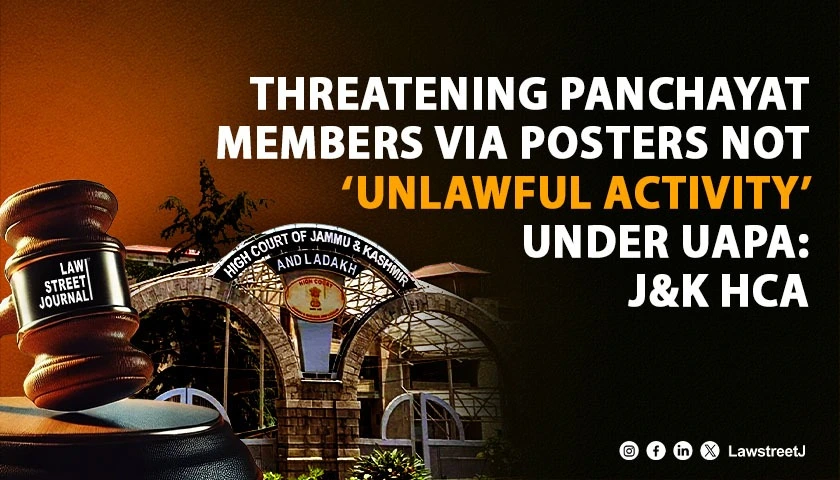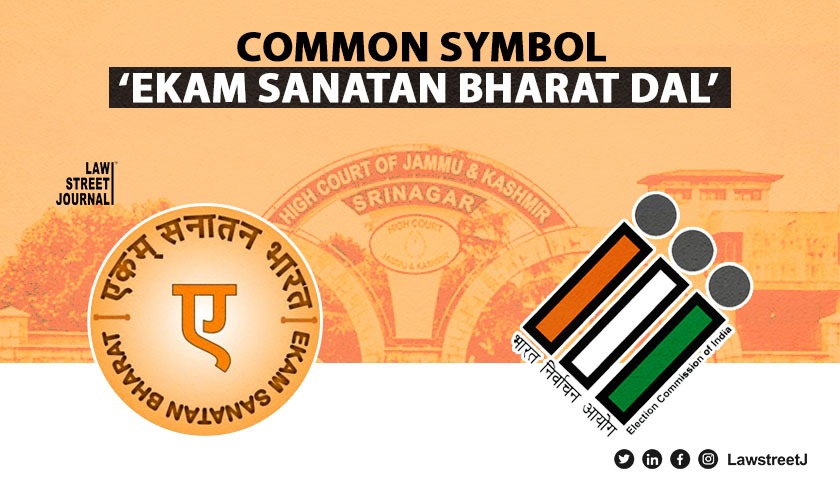Jammu: The Jammu & Kashmir and Ladakh High Court has upheld the acquittal of a man charged under the Unlawful Activities (Prevention) Act (UAPA) for allegedly pasting posters threatening Panchayat members, ruling that such threats do not fall within the definition of “unlawful activity” under the Act. The Court also noted that the accused had already endured the ordeal of trial for over eight years.
Justice Sanjeev Kumar, along with Justice Sanjay Parihar, delivered the judgment on July 31, 2025, in CrlA(D) 45/2024 filed by the Union Territory of J&K against Gh. Mohammad Lone, dismissing the appeal against his acquittal by the Special Judge Designated Under the NIA Act, Anantnag.
The case originated from FIR No. 59/2012 registered at Police Station Srigufwara on September 8, 2012, under Section 13 of the UAPA, based on information that the proscribed organisation Hizbul Mujahideen had affixed posters on electric poles threatening elected Panchs/Sarpanchs to resign or face dire consequences.
Police rounded up five persons, including the respondent, on suspicion and took their specimen handwriting for comparison with the writing on the offending posters. After an FSL handwriting expert concluded similarity between the respondent’s specimen and the poster writing, a charge sheet was filed, and charges were framed under Section 13 of the UAPA on June 19, 2018.
However, the trial court acquitted Lone on February 20, 2024, finding that “the prosecution had miserably failed to connect the respondent with the commission of the offence with which he was charged.”
The High Court noted the complete collapse of the prosecution case, observing that key witnesses PW-1 Bashir Ahmad Rather, PW-2 Ab. Rashid Rather, and PW-3 Mohd Shaban Nengroo “have not supported the prosecution case and were declared hostile on the request of the prosecution.”
The Court further observed that even PW-4 Asadullah Lone, a witness to the seizure of the offending posters, “does not advance the prosecution’s case in any manner. He has even denied having made any statement under Section 161 Cr.P.C.”
The only incriminating evidence was the testimony of PW-6 Altaf Ahmad, the FSL expert, who reported similarity between the specimen handwriting and the writing on the posters. However, the Court held: “Other than the statement of PW-6 Altaf Ahmad, that the specimen writing taken by the police in the presence of the Executive Magistrate is similar to the writing on the offending posters, there is no material connecting the respondent with the preparation and affixing of the offending posters.”
Significantly, the Court conducted a detailed analysis of Section 13 of the UAPA and concluded that the ingredients of the offence were not satisfied. Examining the definition of “unlawful activity” under Section 2(o) of the Act, the Court noted that the action must be intended to bring about cession or secession of Indian territory, disrupt sovereignty and territorial integrity, or cause disaffection against India.
The Court therefore observed: “The writings on the offending posters were only aimed at and intended to intimidate elected Panchs by extending a threat that in case they did not resign from their positions, they would be done away with. Such words in writing cannot be said to be intended to bring about cession or secession of any part of the territory of India from the Union, nor do they disclaim, question, disrupt, or intend to disrupt the sovereignty and territorial integrity of India.”
It further held that such threats “cannot be understood to cause or intend to cause disaffection against India” and concluded that “the act attributed to the respondent does not fall within the purview of ‘unlawful activity’ under Section 2(o) of the Act.”
In a notable observation, the Court stated that “the ingredients of Section 13 of the UAPA were thus not made out” and that “the trial court should have discharged the respondent of the charge and instead framed an appropriate charge under the Ranbir Penal Code (RPC).”
However, exercising judicial restraint and compassion, the Court declined to remand the matter back for framing charges under the RPC, stating: “We could have remanded the matter back to the trial court for framing such a charge, but having regard to the fact that the respondent has already faced the ordeal of trial for more than eight years, it would not be appropriate to do so.”
Ms. Maha Majeed, Assisting Counsel, appeared for the Union Territory on behalf of Mr. Mohsin Qadri, Sr. AAG, while Mr. Zahid Hussain Dar with Mr. Zahid Afzal represented the respondent.
Case Title: Union Territory of J&K through SHO Police Station Srigufwara, Anantnag vs. Gh. Mohammad Lone




![Publicly slapping wife does not constitute outraging modesty: J&K HC [Read Order]](/secure/uploads/2024/02/lj_7549_husband-slapping-wife-publicly.webp)
![Jammu and Kashmir High Court Grants Bail To Gang Rape Accused, Emphasizes Presumption Of Innocence [Read Order]](/secure/uploads/2024/05/lj_6000_5007a767-4748-4bed-9dab-8fa14a4d262b.webp)
![Mere involvement of relatives in anti national activities in the past can not be a ground to deny Govt contracts: J&K and Ladakh HC [Read Judgment]](/secure/uploads/2024/06/lj_3301_79dd6df6-5b62-4057-8762-d0e460af98e6.webp)






